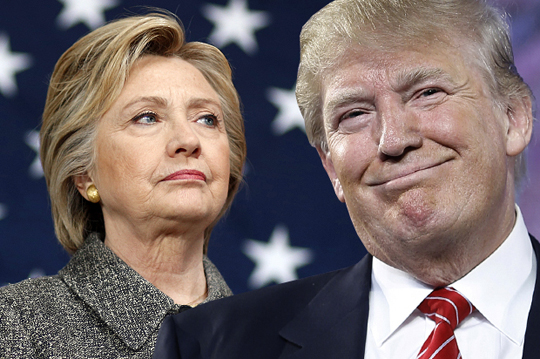Washington, Nov 9: Donald Trump was on the cusp of creating history as he inched closer to clinching the US presidency with a strong showing in battleground states helping him trump Hillary Clinton in the knife-edge race.

Major US news networks projected Republican candidate Trump to have won the crucial battleground states of Florida, Ohio and North Carolina.
Clinton, 69, who grabbed the traditional Democratic strongholds of California and Virginia, was now facing a tough challenge from the 70-year-old real estate billionaire, who joined politics only 18 months ago.
"Trump moves closer to White House," said Politico as Trump's total of electoral college votes -- as per CNN projections -- touched 232, against Clinton's 209.To win the presidential election, a candidate needs 270 of the 538 electoral college votes.
The New York Times said there is an increasing chance of Trump being elected as the next president of the United States.
CNN projected that Trump had won 23 states while Clinton emerged victorious in 17.
According to the channel, Trump won Florida (29 electoral college votes), Georgia (16), Ohio (18), North Carolina (15), North Dakota (3), South Dakota (3), Nebraska (4), Kansas (6), Oklahoma (7), Texas (38), Wyoming (3), Indiana (11), Kentucky (8), Tennessee (11), Mississippi (6), Arkansas (6), Louisiana (8), West Virginia (5), Alabama (9), South Carolina (9), Montana (3), Idaho (5) and Missouri (10).
Clinton emerged victorious in California (55), Hawaii (4), Illinois (20), New York (29), New Jersey (14), Maryland (10), District of Columbia (3), Vermont (3), Massachusetts (11), Connecticut (7), Delaware (3), Colorado (9), New Mexico (5), Virginia (13), Oregon (7), Washington (12) and Rhode Island (4).
Trump, who ran an improbable and often ugly campaign against the establishment, was holding on to small but significant leads in a series of key states, upending months of polling that had given the advantage to Clinton and raised Republican hopes of seizing back the White House.
"Reaction to the prospect of a Trump presidency rippled across the globe, with financial markets abroad falling as American television networks raised the prospect that Mrs Clinton might lose," The New York Times said.
Virginia, won by Clinton, has a significant Indian- American population and is home to Democratic vice- presidential nominee, Senator Tim Kaine.
In terms of overall vote percentage, Trump has so far received 48.5 per cent of the votes counted so far as against 47 per cent gained by Clinton.
The incoming returns follow a frenzied day of voting across America marked by long lines and last-minute appeals for support from both campaigns.






Comments
poojary papa sothe, like always
Add new comment